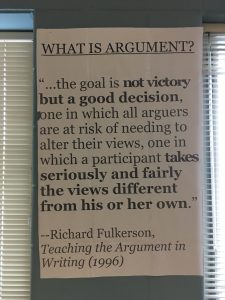Note: I expanded the arguments in the article below and provided practical teaching applications into a full chapter of my book These 6 Things: How to Focus Your Teaching on the Work that Matters Most. When you buy a copy, you directly support my work as a thinker and writer. -DSJR

In the introduction to Teaching the Argument in Writing (1996), there's this spot where author Richard Fulkerson beautifully depicts the argumentative culture I hope to build my classes on each year:
“…I want students to see argument in a larger, less militant, and more comprehensive context — one in which the goal is not victory but a good decision, one in which all arguers are at risk of needing to alter their views, one in which a participant takes seriously and fairly the views different from his or her own.” (p. 17)
Here's how I try kneading this into my class culture:
- Compare: Prompt students to write down what they first think when they hear the word argument, and compare that image to Fulkerson's description.
- This gives me an opportunity to introduce the concept as “Fulkersonian Argument,” the definition of which hangs in my room. (See Figure 1.)
- Remind: When pre-teaching pop-up debates, I will remind students that the kind of experience we're after will at times be debate-like and at other times be discussion-like. Fulkersonian argument is really both.
- Coach: During a pop-up debate, I will interrupt to point out when someone makes a particularly Fulkersonian move, such as:
- taking the views of an opponent seriously;
- fairly paraphrasing when they, to use an excellent Graff/Birkenstein phrase, “name their naysayers”;
- alter their views (and give strong rationale for doing so).
- Model: Likewise, during pop-up debates I will occasionally pop-up myself and seek to model one of the above moves.
- Find: When I hear or see or read examples of Fulkersonian argument, I try to share them with the class.
- Saturate: What gets repeated gets remembered, I find. It's not a fancy truth, but it seems true nonetheless, that the more I say and use and become “Fulkersonian argument,” the more likely it is that my students will as well.
A note on technical skills vs. cultural values
It's important to note that Fulkersonian argument is less about technical skill and more about cultural values. Technical skills are perhaps best practiced using tools like Les Lynn's Refutation Two-Chance (which I write about here), or a template like Paraphrase Plus, or (for delivery versus argumentative skill) an acronym like Palmer's PVLEGS.
Leave a Reply